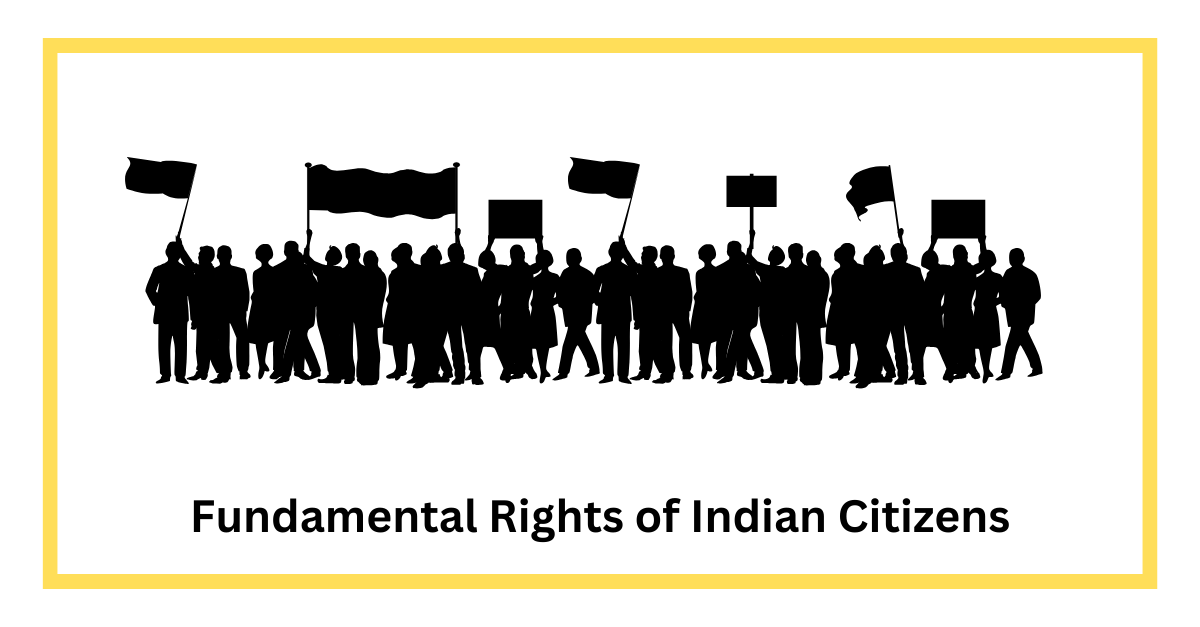The Honorable Justice Madan B Lokur, a former Supreme Court judge who recently delivered the BG Verghese Memorial Lecture in 2020, stated that the right to freedom of speech could not be applied arbitrarily because of its fundamental nature. As Justice Lokur said in his lecture, 'One of the worst ways of curtailing freedom of speech is to charge a person with sedition.'
Overview
Most of us might not be able to name all the Indian fundamental rights in India. But these rights have a strong impact on our everyday lives. Do you know how many fundamental rights of Indian citizens there are in India or total rights in India?
There are eight India fundamental rights. The Constitution has framed eight Indian fundamental rights for us, and these cover a wide range of subjects. We can go through the content below for a full understanding of the same.
Importance of Fundamental Rights India
Fundamental rights only for Indian citizens serve as the bedrock of India’s democratic system and secular principles. They set the fundamental prerequisites for safeguarding individuals’ well-being, ensuring social justice, and promoting equality. They also protect the interests of minority groups and vulnerable segments of society, while simultaneously upholding individual freedom. These rights are instrumental in instituting the rule of law, effectively curbing any excessive exercise of governmental power.
Features of Fundamental Rights India
- Fundamental rights only for Indian citizens differ from regular legal rights in their enforcement. When a regular legal right is violated, the affected person must go through lower courts before reaching the Supreme Court
- Some fundamental rights apply to all citizens, while others extend to all individuals, including foreigners
- Fundamental rights are not absolute; they come with reasonable restrictions related to state security, public morality, decency, and foreign relations
- These rights are justiciable, meaning they can be enforced in court, allowing direct access to the Supreme Court in case of violation
- Parliament can amend fundamental rights through a constitutional amendment, provided it doesn’t alter the Constitution’s basic structure
- During a national emergency, fundamental rights can be suspended, with the exception of those guaranteed under Articles 20 and 21
- In areas under martial law or military rule, the application of fundamental rights can be limited.
Fundamental Rights of Indian Citizens
Most of us would struggle to name the fundamental rights of indian citizens in India. And yet, by defining our most basic freedoms and entitlements, they strongly impact our lives every day. The Constitution recognizes eight fundamental rights of indian citizens in India, but these eight cover subjects so broad that they can – and should – be broken down into many more for a full understanding. For now, though, let’s go through the most important of these rights of Indian citizens.
Right to Equality
- Equality before the law
- Prohibition of discrimination based on religion, race, caste, sex, or place of birth
- Equality of opportunity in matters of employment
Right to Freedom
- Freedom of speech and expression
- Freedom of assembly, association, and union
- Freedom of movement and residence
- Freedom to practice any profession or occupation (subject to certain restrictions)
Right Against Exploitation
- Prohibition of forced labour
- Prohibition of child labour
- Prohibition of trafficking in human beings
All Indians Have the Right Against Exploitation Under the Following Articles of the Constitution
- Trafficking in human beings and forced labor are prohibited under Article 23
- (Employment of Indians under the age of 14 years is prohibited under Article 24.)
Cultural and Educational Rights
- Protection of the rights of minorities to conserve their culture, language, and script
- Right of minorities to establish and administer educational institutions
Right to Freedom of Religion
- Freedom of conscience and the right to freely profess, practice, and propagate religion
Right to Constitutional Remedies
- Right to move the Supreme Court for the enforcement of fundamental rights India
- Right to seek legal remedies against the violation of fundamental rights India
Right to Life
Not just the right to live, but to a life with dignity. This includes the right to education, health, and shelter, which the state provides to those in need. It also outlaws all forms of forced labour, child labour, and human trafficking.
A Public Interest Litigation may be filed when the government is not found to be doing enough to offer or prevent the above, as the case may be. This is often done on behalf of the poor, to effect social change in the public interest without any profit motive. For example, a successful and well-known PIL by the NGO People’s Union for Civil Liberties helped assert the right to food as a fundamental right, leading to a great improvement in public assistance schemes.
These rights originate in England’s Bill of Rights, the United States Bill of Rights, and France’s Declaration of the Rights of Man. While we have discussed these rights as being granted to us, it is often said that they are so fundamental that governments can only take them away from their citizens.
Fundamental Rights Available Only to Citizens
The following enumerates the fundamental rights in the Indian constitution exclusively applicable to citizens (not foreigners):
- Prevention of discrimination based on race, religion, caste, gender, or place of birth (Article 15)
- Equal opportunities in public employment (Article 16)
- Safeguarding the freedom of:
- Speech and expression
- Association
- Assembly
- Movement
- Residence
- Profession (Article 19)
- Protection of the culture, language, and script of minority groups (Article 29)
- The right of minority communities to establish and manage educational institutions (Article 30)
Conclusion
If you were not aware of the India fundamental rights granted to the citizens of India, then you would have got to know the same from the above. Notably, a democratic country offers the rights of Indian citizens to freedom of speech and the right to privacy. These rights have their origin in some other countries as well. Only the government has the authority to take these away from citizens. We have provided you with clear information regarding India’s fundamental rights. For any queries or help, contact our team or leave us your comments below.
FAQs
What is the significance of Article 21 as a fundamental right in the Indian Constitution?
The significance of Article 21 in the Indian Constitution lies in its protection of the right to life and personal liberty. It ensures that no person can be deprived of their life or personal liberty except by due process of law.
How do fundamental rights contribute to the overall development and progress of India?
Fundamental rights, including the right to equality and education, contribute to India's development by ensuring equal opportunities, social justice, and individual growth.
Can you provide a brief overview of the 11 fundamental duties outlined in the Indian Constitution?
The 11 fundamental duties in the Indian Constitution are civic responsibilities that citizens must uphold for the nation's integrity and development. Here are some of the insights: Abide by the Constitution and respect the national flag & National Anthem Upholding the values of our freedom struggle Ensuring the sovereignty and integrity of India is a paramount responsibility Defending the nation and responding to national service calls Fostering a sense of universal brotherhood Preservation of our diverse composite culture is of utmost importance The protection of our natural environment is a collective obligation Promoting a scientific outlook is a crucial Safeguarding public property is a shared responsibility Striving for excellence in all our endeavours is a fundamental duty It is the duty of all parents and guardians to ensure the education of children aged 6-14.
What are the different types or categories of fundamental rights present in the Indian Constitution?
Fundamental rights in the Indian Constitution are categorised into six types: Right to equality Right to freedom Right against exploitation Right to freedom of religion Cultural and educational rights Right to constitutional remedies.
What are the key salient features that distinguish fundamental rights from other legal provisions?
Key salient features distinguishing fundamental rights include their justiciability, enforceability, and their protection against the State's actions. They are directly enforceable by the courts.
How has the concept of fundamental rights evolved over time in India?
The concept of fundamental rights in India has evolved through judicial interpretations, amendments, and changing societal norms to broaden their scope and protect citizens more effectively.
What is the role of Article 31 in the context of fundamental rights?
Article 31 in the Indian constitution related to property rights was repealed, but its significance lay in striking a balance between property rights and the State's power for public welfare.
What specific rights are encompassed under the 'right to freedom' in the Indian Constitution?
The ‘right to freedom’ includes rights like freedom of speech, expression, assembly, and association, as well as the right to move freely throughout India.
How do fundamental rights relate to and protect the rights of various minority groups in India?
Fundamental rights only for Indian citizens to protect the rights of minority groups by ensuring equality, freedom of religion, and safeguards against discrimination.
Can you explain the concept of legal rights and its relationship with fundamental rights in India?
Legal rights refer to rights recognised by law, while fundamental rights are a subset of legal rights, specifically protected by the Indian Constitution, guaranteeing fundamental freedoms and protections to citizens.
1. Is fundamental rights only for Indian citizens?
Yes, fundamental rights are primarily applicable to Indian citizens. However, certain fundamental rights are available to both citizens and foreigners residing in India.
2. What are the fundamental rights of foreigners?
Foreigners residing in India are entitled to certain fundamental rights, such as the right to equality, right to life and personal liberty, and protection against arbitrary arrest and detention. However, some rights, such as the right to vote and certain political rights, are exclusive to Indian citizens.
3. Why are fundamental rights important?
Fundamental rights are crucial for the protection and promotion of individual liberties, equality, and social justice. They serve as a check on the power of the government and ensure that citizens have the freedom to express themselves, practice their religion, and live a dignified life.
Also, Read;










